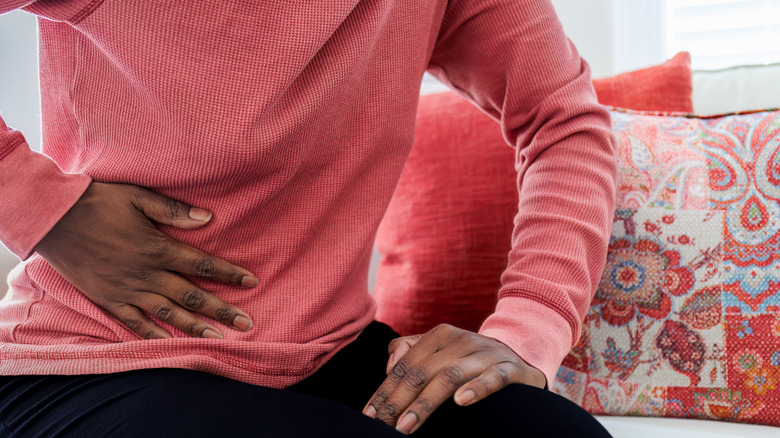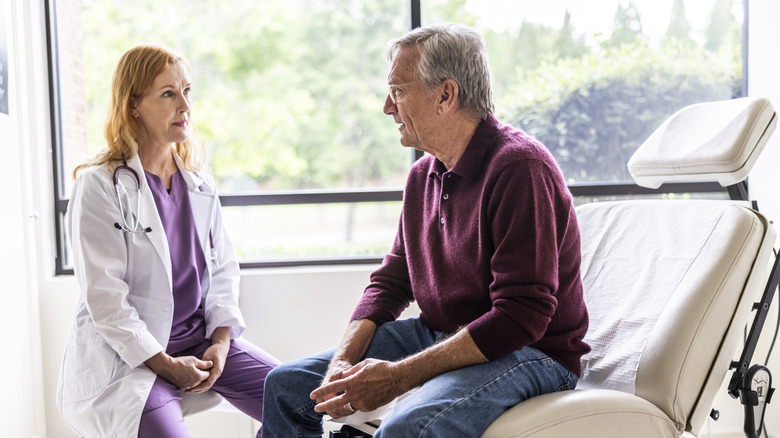What People Over 50 Should Know Before Taking Laxatives To Help Them Poop
Poop happens, but sometimes it doesn't as you get older. Dr. Jaime Sanchez, a colon and rectal surgeon at AdventHealth Carrollwood, tells Health Digest that 16% of men and 26% of women over age 65 experience constipation. A lack of exercise, hydration, and fiber can have people at any age feeling stopped up, but older adults might take medications such as opioids, antihistamines, or antidepressants that can lead to constipation.
Constipation can frustrate your day, making you feel bloated, heavy, or tired, but Sanchez suggests more natural ways to get things moving before reaching into your medicine cabinet. "Before taking an over-the-counter laxative, consider increasing physical activity and ensuring sufficient fiber and fluid intake," he said. "Increasing daily fiber intake can be achieved through various foods or supplements but may worsen constipation if not accompanied with sufficient water intake."
Although Sanchez says over-the-counter laxatives are safe to take occasionally, he adds that you should talk to your doctor if you experience constipation more frequently. Chronic constipation can be a symptom of a more serious condition.
Health conditions that can cause constipation
If you can set your watch by the timing of your regular bowel movements, an occasional missed poop isn't cause for alarm. "Patients will often complain of constipation during times of stress or disruptions in daily routine, such as with travel," Sanchez said. Symptoms of constipation include having fewer than three bowel movements a week, straining to have these bowel movements, and passing hard stools.
Some people experience constipation for three months or longer, and it can interfere with their daily lives. Sometimes chronic constipation can be secondary to another condition. Although some people with irritable bowel syndrome experience diarrhea, others experience constipation. People with dementia might not be taking in enough fiber and fluid, and their dietary deficiencies combined with a lack of exercise can lead to constipation. Chronic constipation might also be a symptom of neurological disorders such as Parkinson's disease or multiple sclerosis. Uncontrolled diabetes might also lead to chronic constipation. You might also have something blocking your colon or rectum that could make it more difficult to poop.
When to see a doctor about constipation
Sanchez advises seeing a doctor if you have bleeding in your stools, unintentional weight loss, or a mass in your abdomen or rectum. "Constipation with any signs of a possible intestinal blockage, like vomiting, inability to pass gas, or significant abdominal pain, should be considered a possible emergency and medical care sought immediately," Sanchez said. "If constipation leads to significant discomfort or becomes chronic and unable to be relieved by dietary and lifestyle changes, medical evaluation is recommended."
If you have occasional problems pooping, Sanchez suggests drinking 8 to 10 glasses of water a day while boosting your fiber intake to 30 grams a day. Great sources of natural fiber include fruits, vegetables, whole grains, and seeds. "However, if already experiencing constipation, I recommend patients take a daily fiber supplement in order to ensure reaching their goal," he said. "These include psyllium, inulin, or methylcellulose, which are some of the most common and available over-the-counter." Sanchez adds that prune or pear juice can also get you to poop quickly. Getting your body moving can also help in getting your bowels moving again.


